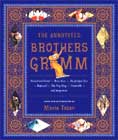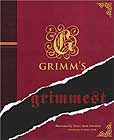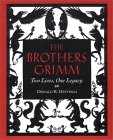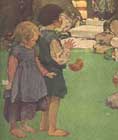
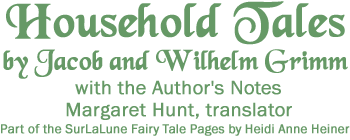
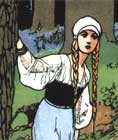
Author's Notes
translated by Margaret Hunt
Return
to
Household Tales:
Table of Contents
Previous
Tale:
The Twelve Huntsmen
Next
Tale:
Jorinde and Joringel
SurLaLune Fairy Tales Main Page
The
Thief and His Master
HANS wished to put his son to learn
a trade, so he went into the church and prayed to our Lord God to know
which would be most advantageous for him. Then the clerk got behind the
altar, and said, "Thieving, thieving." On this Hans goes back
to his son, and tells him he is to learn thieving, and that the Lord God
had said so. So he goes with his son to seek a man who is acquainted with
thieving. They walk a long time and come into a great forest, where stands
a little house with an old woman in it. Hans says, "Do you know of
a man who is acquainted with thieving?" "You can learn that
here quite well," says the woman, "my son is a master of it."
So he speaks with the son, and asks if he knows thieving really well?
The master-thief says, "I will teach him well. Come back when a year
is over, and then if you recognize your son, I will take no payment at
all for teaching him; but if you don't know him, you must give me two
hundred thalers."
The father goes home again, and the son learns witchcraft and thieving, thoroughly. When the year is out, the father is full of anxiety to know how he is to contrive to recognize his son. As he is thus going about in his trouble, he meets a little dwarf, who says, "Man, what ails you, that you are always in such trouble?"
"Oh," says Hans, "a year ago I placed my son with a master-thief who told me I was to come back when the year was out, and that if I then did not know my son when I saw him, I was to pay two hundred thalers; but if I did know him I was to pay nothing, and now I am afraid of not knowing him and can't tell where I am to get the money." Then the dwarf tells him to take a small basket of bread with him, and to stand beneath the chimney. "There on the cross-beam is a basket, out of which a little bird is peeping, and that is your son."
Hans goes thither, and throws a little basket full of black bread in front of the basket with the bird in it, and the little bird comes out, and looks up. "Hollo, my son, art thou here?" says the father, and the son is delighted to see his father, but the master-thief says, "The devil must have prompted you, or how could you have known your son?" "Father, let us go," said the youth.
Then the father and son set out homeward. On the way a carriage comes driving by. Hereupon the son says to his father, "I will change myself into a large greyhound, and then you can earn a great deal of money by me." Then the gentleman calls from the carriage, "My man, will you sell your dog?" "Yes," says the father. "How much do you want for it?" "Thirty thalers." "Eh, man, that is a great deal, but as it is such a very fine dog I will have it." The gentleman takes it into his carriage, but when they have driven a little farther the dog springs out of the carriage through the window, and goes back to his father, and is no longer a greyhound.
They go home together. Next day there is a fair in the
neighboring town, so the youth says to his father, "I will now change
myself into a beautiful horse, and you can sell me; but when you have
sold me, you must take off my bridle, or I cannot become a man again."
Then the father goes with the horse to the fair, and the master-thief
comes and buys the horse for a hundred thalers, but the father forgets,
and does not take off the bridle. So the man goes home with the horse,
and puts it in the stable. When the maid crosses the threshold, the horse
says, "Take off my bridle, take off my bridle." Then the maid
stands still, and says, "What, canst thou speak?" So she goes
and takes the bridle off, and the horse becomes a sparrow, and flies out
at the door, and the wizard becomes a sparrow also, and flies after him.
Then they come together and cast lots, but the master loses, and betakes
himself to the water and is a fish. Then the youth also becomes a fish,
and they cast lots again, and the master loses. So the master changes
himself into a cock, and the youth becomes a fox, and bites the master's
head off, and he died and has remained dead to this day.
Next
Tale:
Jorinde and Joringel
Grimm, Jacob and Wilhelm. Household Tales. Margaret Hunt, translator. London: George Bell, 1884, 1892. 2 volumes.
Notes
From Münster. There is a variant from Vienna. A master-wizard tries to find a youth to assist him who can neither read nor write. He asks one whom he meets, "Canst thou read and write?" "Yes," answers the youth. The wizard says, "If thou canst read and write thou wilt be of no use to me." "Oh, you are speaking of reading and writing!" says the youth. "I misunderstood you; I thought you were asking if I could scream and eat; and both these things I understand thoroughly, but of reading and writing I know nothing. The master-wizard thinks, "He will suit me," and, as he likes him in other respects, he takes him. The youth, however, was quick-witted, and knew very well how to read and write, and was only pretending to be stupid. So he remained some time in service, and lent a hand in the wizard's work, but whenever he was out of the way or gone out, the boy secretly read the books of magic and learnt by heart the formulas and rules. This continued until one day the master found him reading one of the books, and saw what had happened. "Wait," cries he; "thou shalt not escape me!" The boy hastily utters a powerful spell, becomes a bird, and flies away. The master as swiftly changes himself into a bird of prey and pursues him. The narrator had forgotten the series of metamorphoses which now followed, but the sequel was that the youth proved cleverer than the master, and whilst the latter was lying before him in the form of a grain of corn, the youth took that of a cock, and swallowed him, by which the magician was lost and annihilated.
There is another form of the tradition in Müllenhoff, No. 27, and in Pröhle's Märchen für die Jugend, No. 26. Incontestably the finest is the story in Straparola, 8, 5, in the complete edition (see further on); but the Danish in Etlar, p. 36, is also very good. In Polish see the Danish collection in Molbech, No. 66, p. 66, and Lewestam, p. 110. In Wallachian, The Devil and his Pupil, Schott, No. 18. In Servian, see Wuk, No.6. The similar, though not identical, transformations of the two magicians in the well-known story in the Thousand and One Nights (1, 385, 386), should be remarked. It likewise occurs that one of the magicians changes himself into a pomegranate, the seeds of which the other, who is in the form of a cock, tears out; but, as he has overlooked one seed, the metamorphoses continue. Others are to be found in the stories No. 56, 76, 79, and also in the Welsh saga of Ceridwen (Mone, 2. 521.) in which at last a hen devours the seed. Lastly, in Simplicissimus (p. 212, 23 Mömpelg Edition) similar, but seriously intended feats of magic are related. Malagis likewise chances to find the magic books of Baldaris, whom he has regarded as his father, and secretly learns the art of magic from them. Once, when they are seated at table, Baldaris enchants hares and rabbits, which run about after each other; then Malagis causes two beautiful greyhounds to leap upon the table, which chase the little animals and tear them to pieces. Baldaris enchants some water, and every one is compelled to wash his hands in it, but Malagis causes the water to become black, and it sticks to them like pitch. (Heidelberg, MS. folio 19b, 20a.) Compare with this the Hungarian story, The Glass Hatchet (Gaal, No 3), where also from the one animal another but a weaker one always arises, and the last is an egg. In the Bohemian story in Gerle (p. 241) the evil spirit changes himself from a dragon into an eagle, and then into a fly; but the fly is caught in the web of a spider, who is a good spirit, and is by him devoured.
©Heidi
Anne Heiner, SurLaLune Fairy Tales
E-mail: surlalune@aol.com
Page last updated October 15, 2006
www.surlalunefairytales.com




